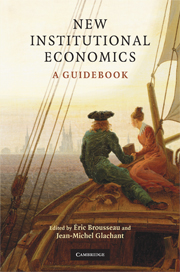

Maucourant, Jérôme and Plociniczak, Sébastien 2009. L’« institution » selon Karl Polanyi. Fondements et mise en perspective contemporaine. Tracés, p. 143.
Bretzke, Wolf-Rüdiger 2009. Supply chain management: notes on the capability and the limitations of a modern logistic paradigm. Logistics Research, Vol. 1, Issue. 2, p. 71.
Bretzke, Wolf-Rüdiger and Barkawi, Karim 2010. Nachhaltige Logistik. p. 1. Bretzke, Wolf-Rüdiger 2010. Logistische Netzwerke. p. 337.Oritani, Yoshiharu 2010. Public Governance of Central Banks: An Approach from New Institutional Economics. SSRN Electronic Journal,
Mayer, Jörg H. and Marx, Frederik 2010. Global Perspectives on Design Science Research. Vol. 6105, Issue. , p. 506.
Bretzke, Wolf-Rüdiger 2011. Sustainable logistics: in search of solutions for a challenging new problem. Logistics Research, Vol. 3, Issue. 4, p. 179.
Maucourant, Jérôme and Plociniczak, Sébastien 2011. Penser l’institution et le marché avec Karl Polanyi. Revue de la régulation, Vol. 10, Issue. ,
Mayer, Jörg H. Winter, Robert and Mohr, Thomas 2011. Service-Oriented Perspectives in Design Science Research. Vol. 6629, Issue. , p. 291.
Wawrosz, Petr 2011. Creation and Violation of Institutional Equilibrium in Redistribution Systems. Politická ekonomie, Vol. 59, Issue. 4, p. 526.
Wong, Franky W. H. Chan, Edwin H. W. and Yu, Ann T. W. 2011. Property Developers’ Major Cost Concerns Arising from Planning Regulations under a High Land-Price Policy. Journal of Urban Planning and Development, Vol. 137, Issue. 2, p. 112.
Scheidel, Walter 2012. The Cambridge Companion to the Roman Economy.BOYER, PASCAL and PETERSEN, MICHAEL BANG 2012. The naturalness of (many) social institutions: evolved cognition as their foundation. Journal of Institutional Economics, Vol. 8, Issue. 1, p. 1.
ANTONIOLI, Barbara and MASSARUTTO, Antonio 2012. THE MUNICIPAL WASTE MANAGEMENT SECTOR IN EUROPE: SHIFTING BOUNDARIES BETWEEN PUBLIC SERVICE AND THE MARKET. Annals of Public and Cooperative Economics, Vol. 83, Issue. 4, p. 505.
Bretzke, Wolf-Rüdiger and Barkawi, Karim 2012. Nachhaltige Logistik. p. 1. Hu, Yi 2012. Outlook of China’s State-Owned Enterprises Transformation. SSRN Electronic Journal, Conison, Alex 2012. The Encyclopedia of Ancient History.Rajão, Raoni Azevedo, Andrea and Stabile, Marcelo C. C. 2012. INSTITUTIONAL SUBVERSION AND DEFORESTATION: LEARNING LESSONS FROM THE SYSTEM FOR THE ENVIRONMENTAL LICENCING OF RURAL PROPERTIES IN MATO GROSSO. Public Administration and Development, Vol. 32, Issue. 3, p. 229.
Nicita, Antonio and Sepe, Simone M. 2012. Incomplete contracts and competition: another look at fisher body/general motors?. European Journal of Law and Economics, Vol. 34, Issue. 3, p. 495.
Bretzke, Wolf-Rüdiger and Barkawi, Karim 2013. Sustainable Logistics. p. 85. Edited by Éric Brousseau , Université de Paris X , Jean-Michel Glachant , Université de Paris XII Publisher: Cambridge University Press Online publication date: July 2010 Print publication year: 2008 Online ISBN: 9780511754043 Digital access for individuals (PDF download and/or read online) Added to cart Digital access for individuals (PDF download and/or read online)Institutions frame behaviors and exchanges in markets, business networks, communities, and organizations throughout the world. Thanks to the pioneering work of Ronald Coase, Douglas North and Olivier Williamson, institutions are now recognized as being a key factor in explaining differences in performance between industries, nations, and regions. The fast-growing field of new institutional economics analyzes the economics of institutions and organizations using methodologies, concepts, and analytical tools from a wide range of disciplines (including political science, anthropology, sociology, management, law, and economics). With contributions from an international team of researchers, New Institutional Economics provides theoreticians, practitioners, and advanced students in economics and social sciences with a guide to the many recent developments in the field. It explains the underlying methodologies, identifies issues and questions for future research, and shows how results apply to decision making in law, economic policy, management, regulation and institutional design.
'The New Institutional Economics is an exciting and active research field, and a comprehensive guide to its achievements and future prospects has been long overdue. This book admirably fills this need. Chapters written by experts in various subfields are complemented by excellent commentaries by Oliver Williamson and the editors. New entrants to the field can use it almost as a textbook; practitioners will use it to reinforce their knowledge and as a great reference tool.’
Avinash Dixit - John J. F. Sherrerd '52 University Professor of Economics, Princeton University
'This guide offers the reader a tour de force through the ramifications of the new institutional economics. It is a reference not only for those scholars who find their roots in transaction cost theories but for all those addressing institutional analysis.'
Giovanni Dosi - Professor of Economics, Sant'Anna School of Advanced Studies, Pisa
'Eric Brousseau and Jean-Michel Glachant’s New Institutional Economics: A Guidebook provides a highly readable 'road map' to the varied contributions of the New Institutional Economics. That eclectic stream of research, principally based on transaction costs, property rights, and agency theory, takes an applied perspective to understand how institutions work in the real world. Hence this literature is of immediate interest to strategy and international business scholars. This book, with chapters on organization and strategy, the theory of the firm, transition economies, franchising, make-or-buy decisions, and inter-firm alliances, among others, offers a wealth of fresh and provocative ideas from this emerging literature that are eminently useful to scholars in international business and strategy.'
Jean-Francois Hennart - Professor of International Management, Tilburg University
'New Institutional Economics (NIE) has been one of the most successful fields of applied economics, and its contributions have been far-reaching, methodologically and substantively. Methodologically, NIE has developed valuable intersections with other fields in economics, including game-theory, law and economics, public choice and constitutional political economy, industrial organization, managerial economics, and development economics. Substantively, the applications of NIE span through many disciplines, ranging from law to politics, to institutional design, to contracting and business organization. This book is a testament to the growing success of NIE and a valuable guide to its literature for both insiders and outsiders to the field.'
Francesco Parisi - Professor of Law, University of Minnesota Law School, and Professor of Public Finance, University of Bologna